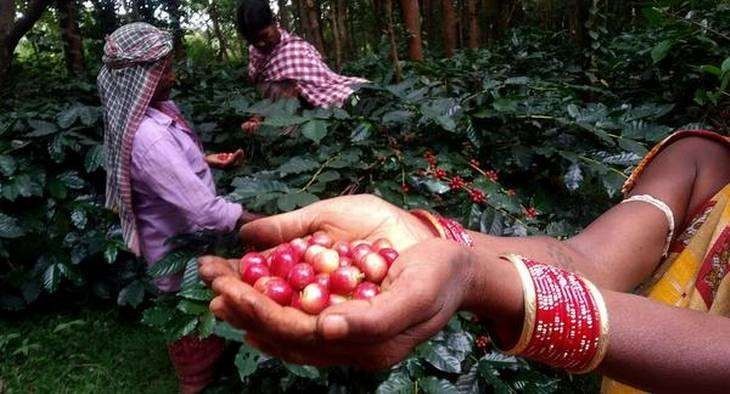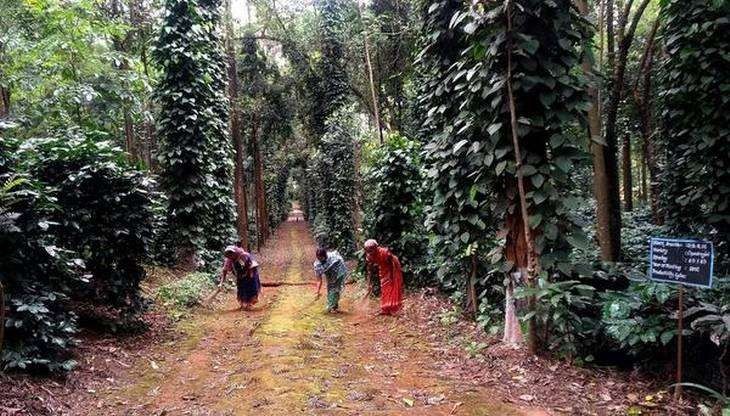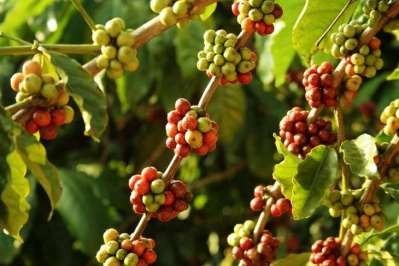Organic coffee farming is transforming the lives of tribal communities in Odisha’s Koraput district
- A wide variety of spices and fruits grown in the coffee field diversifies the income of tribal farmers
- Not too long ago, Surya Chhautia was ready to give up on a 100-acre coffee plantation in Golur village in Odisha‟s Koraput district. The plantation had been lying unattended, yielding little.
- But today, Chhautia, 39, from the Valmiki community, is leading a campaign to add another 100 acres to the plantation and to turn his fellow villagers into coffee growers. Koraput, situated in the Eastern Ghats at a height of 3,000 feet above sea level, is known as much for its picturesque hills and streams as it is for its organic coffee. Koraput‟s cool climes make it ideal for coffee growing.
- Chhautia‟s enthusiasm reflects a new interest in coffee growing in Koraput where the crop was introduced some 90 years ago.
- For the past two years, the project administrator of Koraput‟s Integrated Tribal Development Agency, Karu Soren, has been receiving a steady stream of requests from tribal and Dalit communities to help convert wasteland and common land into coffee plantations. “The trend shows a growing interest among tribal and Dalit communities to diversify their income through coffee,” says Soren.
Plucked ripe cherries
- Three self-help groups (SHGs) in Golur, involved in coffee growing, have earned over ₹40,000 each from the sales of the red cherry. “This year, our profit margin has grown by ₹12,000 per SHG. The
- larger plantation area will help create livelihoods for more villagers,” says Debaki Chhautia, president of the Golur Talasahi SHG. This crop has indeed brought about a remarkable change in the lives of the tribal people who have primarily practised shifting cultivation for generations.
Game changer
The change in Koraput, a district affected by left-wing extremism, came about when different departments joined hands to procure cherries, process the seeds, package them, and sell them in the international market.
Women workers at the premises of the Coffee Board in Koraput,
- Established in Odisha in 1930 by the erstwhile royals of Jeypore on an experimental basis in the neighbouring Bichalkota village, the coffee plantation was subsequently adopted by the Directorate of Soil Conservation and Watershed Development to check siltation at the Machhkund hydroelectricity project site in 1958. Using the forest canopy, the directorate started expanding the plantation area in a graded manner. The expansion, however, did not pick up pace because of fund constraints and policy bottlenecks. Now, 4,238 ha of land has been brought under coffee plantations while the potential area available for the crop is 1,45,170 ha in Koraput. Neighbouring Andhra Pradesh, which has similar climatic conditions, boasts, for instance, of 71,356 ha of coffee plantations established around the same time.
- In 2016-17, the Koraput district administration founded the Coffee Development Trust to create a single platform to remove bottlenecks and to turn the district into a hub of coffee and spices. As per the 10-year plan, 46,500 ha will be brought under shade plantation and 22,570 ha under coffee in the district. Some 25,000 families, mostly from tribal communities, will be given a record of rights for coffee plants as long-term livelihood.
- But expanding the area under cultivation cannot be meaningful without value addition to the crop. Earlier, raw coffee cherries were transported to Andhra Pradesh and Karnataka; farmers earned ₹35 per kilo while the procurement price went up to ₹45 per kilo. This is when the Tribal Development Co-operative Corporation of Odisha Ltd. (TDCCOL), with technical support from the Regional
- Coffee Board, made a market intervention. It promoted the beans as „Koraput Coffee‟, and the brand was an instant hit in the national and international market, being organic. Koraput Coffee is now sold on several e-commerce platforms and an entire coffee processing chain is being set up.
Wild cherries
- “To maintain quality, the coffee fruit is de-pulped the same night at a processing unit in Koraput and the seeds are sun-dried for 11 days. The entire process conforms to international standards and tastes,” says Mansi Nimbhal, managing director, TDCCOL . This year, the corporation procured 28 metric
- tonnes of cherry and transferred the dues directly to the farmers‟ accounts. Coffee growers, who were contemplating leaving the sector, stuck on thanks to the door-to-door collection and a good price for the red cherry.
Coffee cherry clusters on a branch
- But there are challenges: “In Odisha, coffee continues to be a district policy, while Andhra Pradesh has brought coffee plantation under State policy and has earmarked funds for the development of the crop,” says Ajit Kumar Rout, senior liaison officer, Coffee Board. Koraput coffee‟s potential is huge, he says. “The taste of Koraput Coffee definitely differs from others. We have a diverse variety of coffee plants. And the plants grow in the wild, fetching us a better price for their organic value,” says Rout.
- As the procurement and marketing networks become streamlined, at least four private entrepreneurs have shown interest in setting up processing units in Koraput. This competition should benefit tribal farmers hugely.
- Coffee plantation indeed appears to be a win-win proposition for the tribal and Dalit communities of Koraput. The shade plantation needed for coffee prevents soil erosion on the sloping terrain and stabilises the micro-climate. A wide variety of spices and fruits grown in the coffee field diversifies the income of tribal farmers in a backward region. The farmers also meet their fuel wood needs from fallen branches of shade trees. And coffee may well be a way out of conflict in this violence-hit area.
Some pepper please
- The plan to create self-help groups around coffee plantations, which is all set to create a web of economic activities for tribal communities in Koraput, looks likely to ensure that the women will no longer have to migrate to other areas looking for daily wage work.
- Sunita Khila, 35, from Golur village, used to walk miles to collect non-timber forest produce and fuel wood. Now, with coffee becoming a viable source of income, Sunita‟s dependence on the forest has decreased.
- Coffee, however, is not the only livelihood option that women like Sunita have. Mission Shakti, launched by the State Department of Women and Child Development, is helping these women slowly but surely become economically independent.
- Sunita says the producers‟ group in Golur is considering taking up pepper cultivation as well, using the shade trees to grow pepper climbers, which need little maintenance and give good returns. Mission Shakti works with the Odisha Rural Development and Marketing Society (ORMAS) to create producers‟ groups among coffee growers and give working capital of up to ₹1 lakh to each group, and ₹2.04 lakh for institution and capacity building. ORMAS supports the groups while the Tribal Development Co-operative Corporation of Odisha takes care of training.



